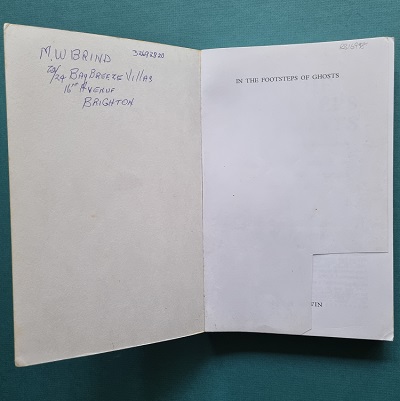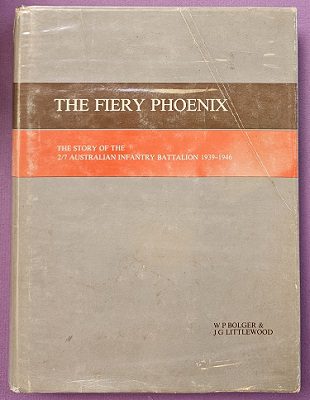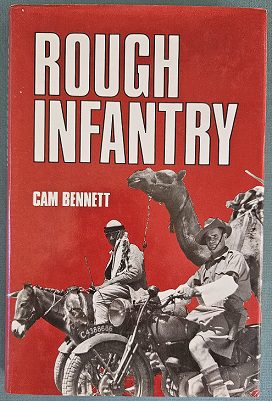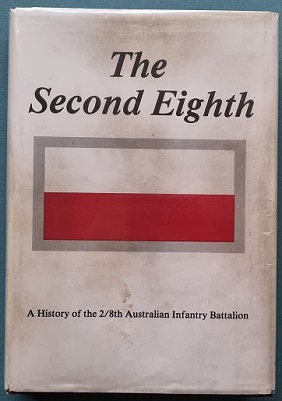Description
Title: In the Footsteps of Ghosts – With the 2/9th Battalion in the African Desert and the Jungles of the Pacific
Author: Spencer, Bill
Condition: Very Good – Section missing from the front end page and previous owners details on the inside of the front cover as can be seen in the image, priced with these faults in mint.
Edition: 1st Edition
Publication Date: 1999
ISBN: 1865081450
Cover: Soft Cover without Dust Jacket – 262 pages.
Comments: The detailed history of the 2/9th Battalion during World War II.
Bill Spencer’s story starts in the Great depression, the economic disaster that moulded the character of the soldiers who fought in the Second World War. Bill and his mates were put to the ultimate test in a succession of battlefields from Girabub and Tobrul in North Africa to Milne Bay, Buna, Sanananda, Shaggy Ridge and Balikpapan in the Paciifc. Bill was a young soldier who participated in these battles. He was also a keen observer. As an author he has captured not only some of the most critical Australian fighting of the Second World War, but most importantly, has provided a unique insight into the men who fought these battles and what they achieved.
The 2/9th, the first Queensland battalion of the Second AIF, assembled for the first time at Redbank Camp in Brisbane on 13 November 1939. It became part of the 18th Brigade of the 6th Australian Division. After training at Redbank, and at Rutherford and Ingleburn in New South Wales, the 2/9th embarked with the brigade for the Middle East on 5 May 1940.
En route to the Middle East, the 18th Brigade was diverted to the United Kingdom to bolster its defences following the fall of France. The 2/9th disembarked at Gourock in Scotland on 18 June and was subsequently based at Lopcombe Corner, near Salisbury, in England. The battalion relocated to Colchester in October and left the United Kingdom on 17 November.
The 2/9th arrived in Egypt on 31 December 1940. In the United Kingdom, the 18th Brigade had become part of the newly-formed 9th Australian Division, but in Egypt in February 1941 it was transferred to the 7th Division. On 21 March, the 2/9th attacked the Italian outpost of Giarabub and in the first week of April it moved, with the rest of the 18th Brigade, to reinforce Tobruk against the German advance rapidly closing on it. The battalion participated in the defence of Tobruk until it was withdrawn at the end of August. After Tobruk, the 2/9th trained in Palestine before joining the forces garrisoning Syria in late September. After returning to Palestine in early January 1942, the 2/9th sailed for Australia from Suez on 12 February, disembarking at Adelaide on 28 March.
Papua was the 2/9th’s next battleground. It fought in the desperate defence of Milne Bay between 2 and 9 September and, between 18 and 24 December, in the gruelling and often ill-conceived slogging match that was the battle for Buna. The 2/9th’s final engagement in Papua was at Sanananda between 12 and 24 January 1943. The horrendous impact of both the fighting and tropical diseases in Papua was evident in the 2/9th’s casualty statistics. Prior to Buna it had numbered 666 all ranks. Despite receiving 300 reinforcements prior to Sanananda, only 89 remained standing when the battalion was withdrawn to Port Moresby in the first week of February 1943.
The 2/9th returned home on 12 March 1943 but was back in Papua by early August. It trained around Port Moresby and then deployed to the Finisterre Mountains in New Guinea on 31 December. There, between 2 January and 1 February 1944, it participated in the operations to capture Shaggy Ridge, including, on 21 January, the second highest point in the Finisterres – Green Sniper’s Pimple. Arriving back in Australia on 20 May, the 2/9th spent a year training before undertaking its final operation of the war. On 1 July 1945 the battalion landed at Balikpapan in Borneo. It was initially in reserve, but on 5 July commenced operations to clear the Japanese from the western side of Balikpapan Bay; these were still underway when the war ended on 15 August 1945. 2/9th personnel were progressively returned to Australia for discharge and the battalion disbanded at Balikpapan on 3 January 1946.
Includes Nominal Roll






